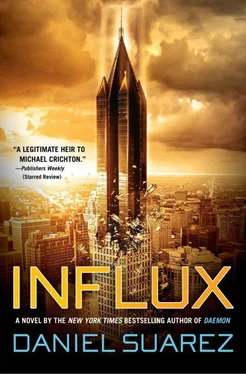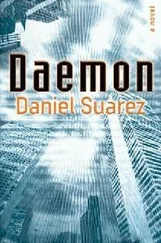“Specifically…?”
He glanced at his notes. “Congenital synesthesia.”
“What the hell’s that?”
“Apparently he saw music and heard numbers—some crossed wires in the brain. That sort of thing. Had a compulsion for folding paper, too.”
She could see several more scorched origami shapes in the wreckage.
“Undistinguished academic record. Kind of an oddball. Behavioral problems…” He glanced through the papers. “Yada, yada, yada.”
Davis considered this. “Now that’s starting to sound familiar. The New Orleans bombing five years ago—the company founder had Asperger’s or something like that. Wasn’t there another one who had some sort of mental condition?”
Falwell gave her a look. “I’ll go back through the files, but what are you thinking?”
Davis pondered the previous cases. “There was that Winnower bombing in Tampa—before both of us. What, nine years ago? Electrical engineer who had claimed he was financed by the Defense Department. But wasn’t.”
Falwell nodded. “Okay, so maybe it’s high-tech scam artists that Cotton hates. Maybe his mom lost her retirement savings or something.”
“Did this Chirality Labs ever produce a product or file for a patent?”
Falwell flipped through the papers for a few moments before looking up and shaking his head.
“They never do.” Davis looked up at the media helicopters hovering half a mile away. She knew their nose cameras had impressive capabilities. They were combing the crime scene on live TV, adding to Cotton’s ego. “Cotton goes for camera-ready catastrophes.”
“But what’s the point of hitting sham start-up tech firms every couple of years? What’s it accomplish?”
“Cotton’s probably smart enough to realize that if he punches above his weight or too often, we’re going to get some serious manpower focused on this case.”
Falwell considered this.
Davis stood at the edge of the still smoking crater. It was easily twenty feet across and five feet deep. “Two and a half years since the last attack. And nearly two years since the one before that. Who has that kind of patience, Thomas? Who can keep operational security within a group of anarchists for that long?”
Falwell stowed his computer tablet. “I have to say this, Denise. And you need to hear me out.”
She almost cringed. “What? I thought we were good.”
“It’s not that. I’ve been chasing Cotton for seven years. And now that there’s been another bombing—and it’s all over the news again—D.C. will give you additional manpower. Just like they did me.”
“I won’t let them forget all the hard work you did, Thomas.”
“Not my point. My point is that in a year or so this team will be pared down again.”
“Then we’ll have to capture Cotton before then.”
“I’m just letting you know that Cotton is like no narcissistic sociopath I’ve ever heard of. There comes a point when we have to ask ourselves whether Cotton still fits the BAU profile.”
“Okay… we can have them do another workup.”
“I’ve never seen anyone who’s content to disappear for so long—to be almost forgotten. Only to strike again somewhere far away and always with faceless, masked followers. There’s something here we’re not seeing. We’ve had informers inside antitech anarchist groups for years now. It’s as though Richard Cotton doesn’t exist except when he’s attacking.”
She walked up to him. “It’s been a long road, but I hope you know that I need you to do exactly what you’re doing: telling me what you really think.”
He nodded.
Davis walked back toward the knot of emergency vehicles, where Dwight was now approaching with an FBI ERT member. She spoke over her shoulder. “Use the extra agents while we’ve got ’em, Thomas. Chase down all the loose ends. And if Cotton doesn’t exist between attacks, then we’ll just have to conjure him, won’t we?”
“Don’t you need to resequencehim before transport?”
A blond man, physically identical to the first except for his lab coat, bristled and looked up from a holographic computer display. “I’m sorry, do you have a medical classification?”
“I’m just saying, if you gave a longer estimated time of departure, I’d have time to hit the R&R levels before we go.”
“You’re always ‘just saying.’ You’ve got diarrhea of the mouth is what you’ve got.”
“I’ve been away from civilization a long time.”
A clattering noise.
“C’mon, don’t be an asshole. Give us a few hours before they send us back, man.”
Grady watched the men from an inclined position on a metallic table. Grady was still a disconnected head—unable to feel a thing below his neck. And it was panicking him. He stared up at the lights, trying to calm himself—especially because listening to his rapid breathing without feeling anything was freaking him out further.
“Mr. Grady, please stop hyperventilating.”
“Just pump him full of PP-3 and put him on ice for a while.”
“Stop telling me how to do my job.”
“C’mon, do me a solid. A few hours are all I need.”
“I’m not falsifying official paperwork so you can get laid.”
“You’re such a kiss-ass.”
Another two identical men entered Grady’s field of vision. They weren’t handsome, but they all shared that thick-necked, swarthy, alpha-male demeanor. The two new arrivals wore gray guard uniforms with Greek numeric patches on the shoulder—Delta-Alpha and Theta-Tau—as though each was his own fraternity. They glowered down on Grady.
The first tech complained, “Damnit, get the hell out of my lab. All of you.”
“You’d better give us a few hours, Zeta. I haven’t been in the real world for a year and a half.”
“It’s not up to me.”
A ragged older man’s gruff voice boomed out. “Get the hell out of here, you three!”
The two most recent arrivals ducked out without a word. The last one remained, eyeballing someone, who soon walked into Grady’s view. It was the eldest Morrison. The one from Hedrick’s office.
The younger Morrison glared. “I’m not afraid of you, old man.”
The elder Morrison got right in his face. “That can be rectified.”
“A man your age should be careful.”
Morrison smirked. “That’s funny.” He suddenly head-butted the younger man. The young soldier collapsed, and in moments Morrison had his boot on the man’s neck. “Because it’s you who should be careful.”
“Get off me!”
Morrison called out, “Boys! Get this idiot out of here before I kill him.”
Two other clones hurried in and grabbed their compatriot.
Morrison glowered at them. “All of you stay on the transport. You won’t be here long.”
“Yes, sir.”
Morrison’s aged, scarred face followed the men as they carried their injured comrade out. He finally looked down on Grady. “Kids.”
Grady was at a loss for words.
“Don’t give me that look. Mother Nature’s always had clones, Mr. Grady. They’re called twins.” He shook his head ruefully. “I’ve just got way more of ’em than most people.” Morrison turned to the clone in a lab coat. “Zeta, how much longer?”
“About five, ten minutes. Depends on his protein folds.”
Morrison nodded absently, observing the complex imagery on a nearby screen. “I never could get used to all this high-tech crap.” He looked down at Grady again. “But it’s like they say: Anything before you’re thirty-five is new and exciting, and anything after that is proof the world’s going to hell.”
Grady was still trying to get his helplessness-induced panic under control. His breathing was labored.
Читать дальше












